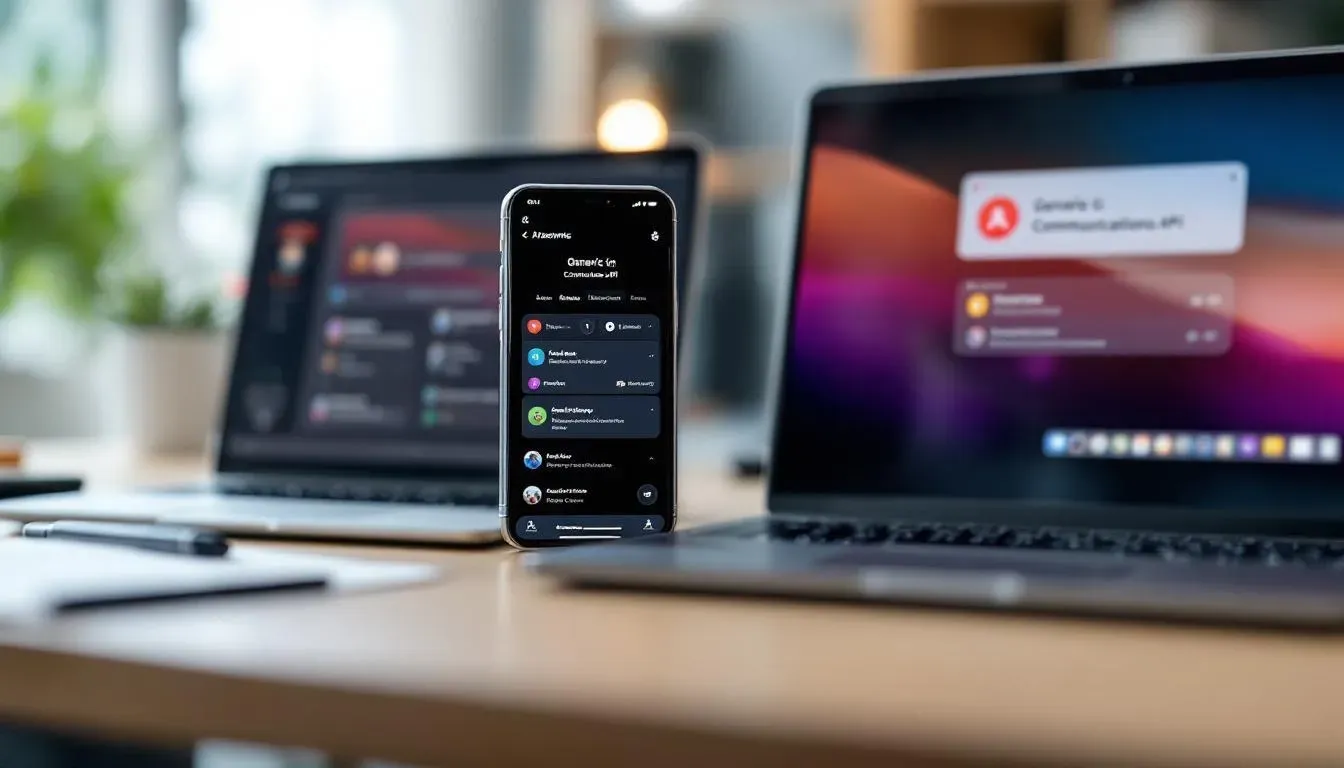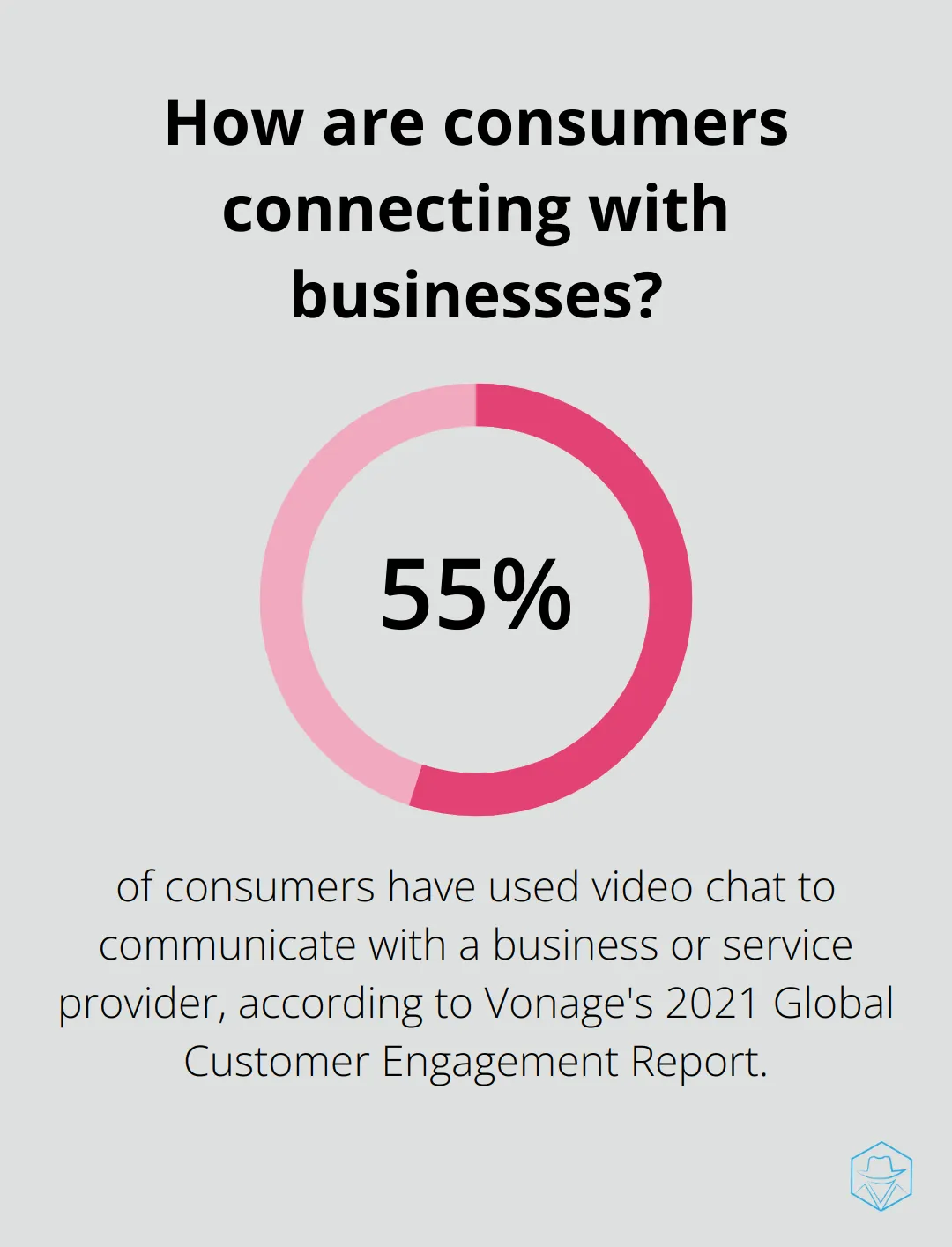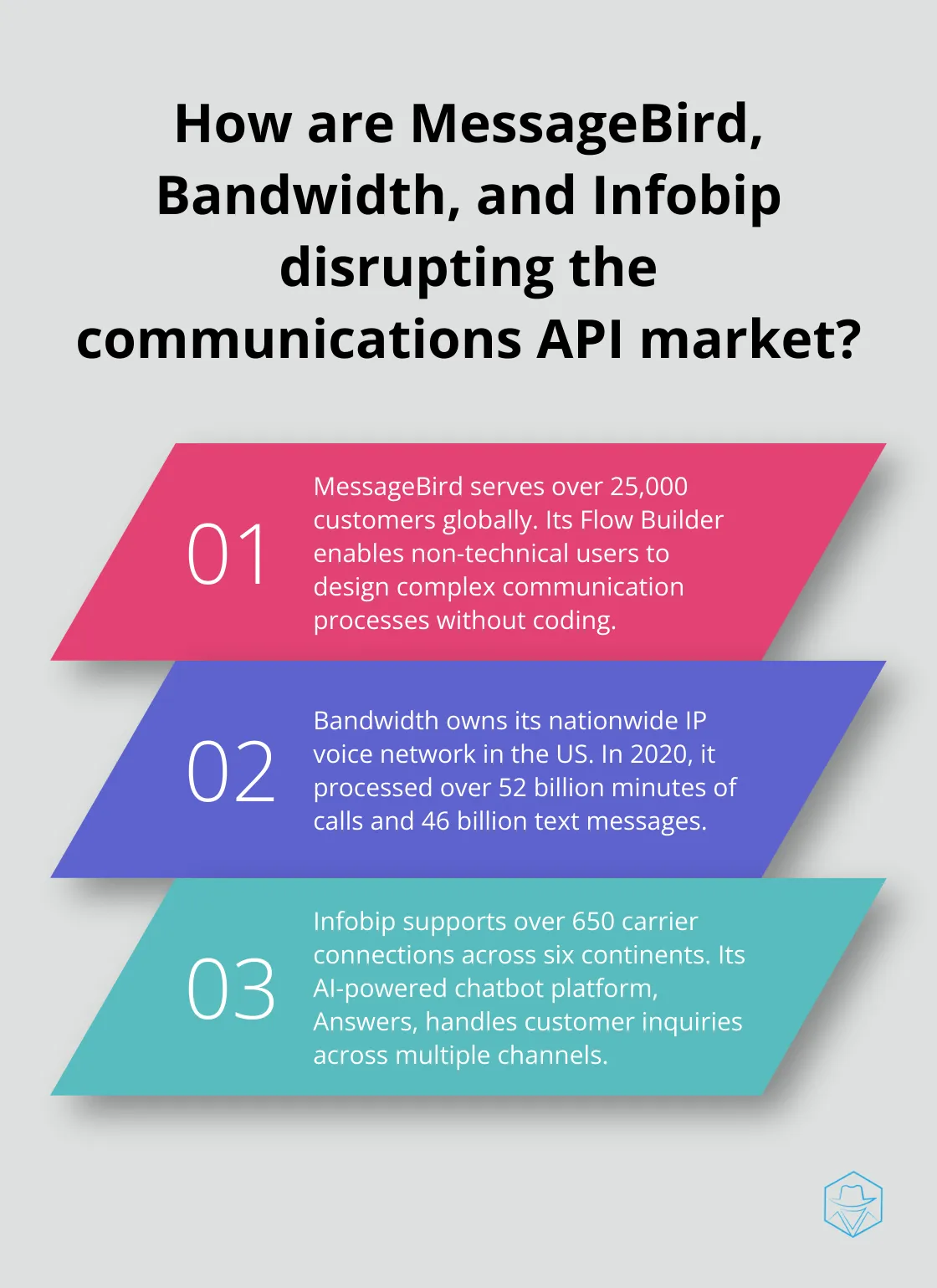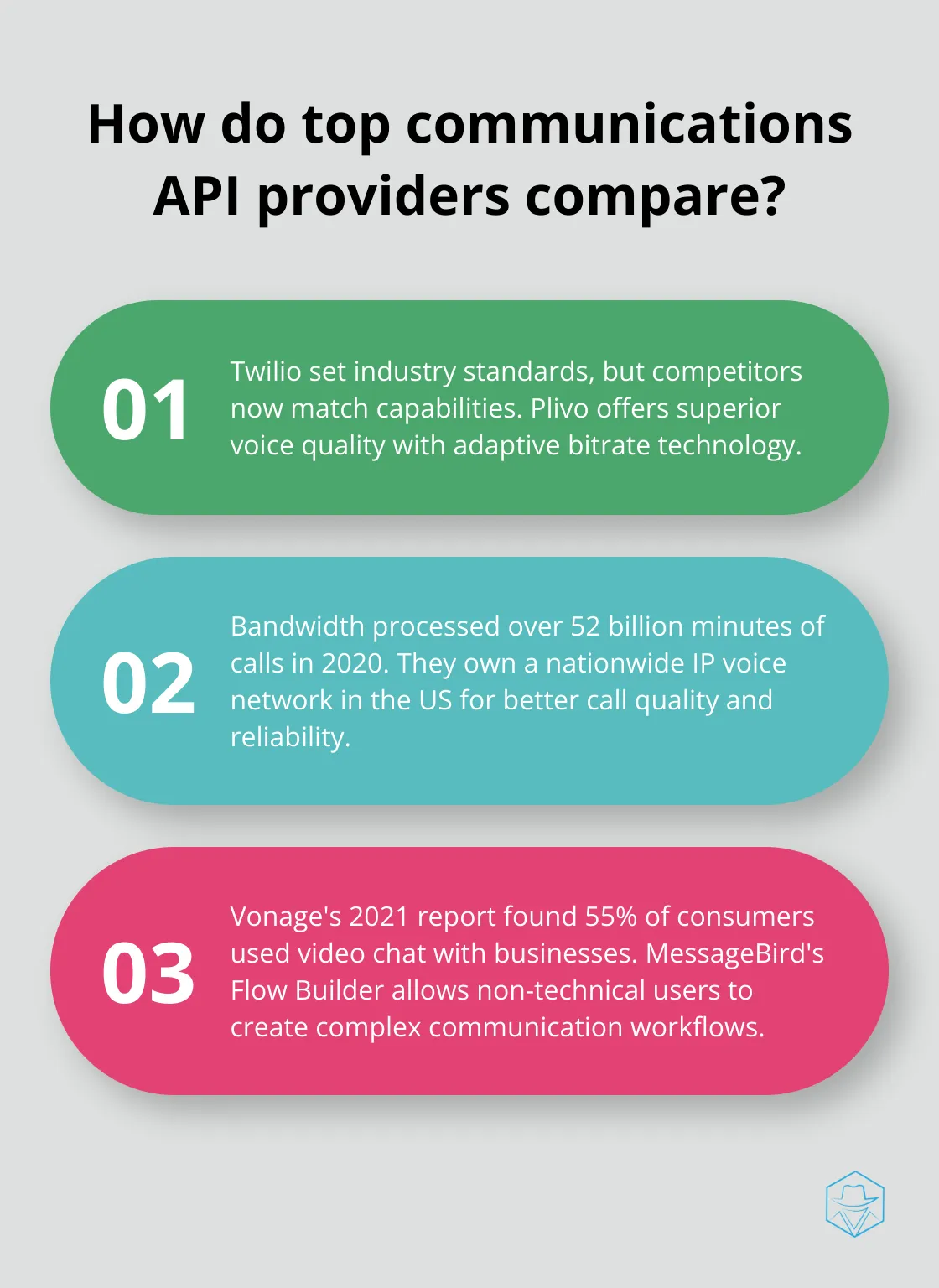Top Twilio Competitors in the Communications API Market

The communications API market is evolving rapidly, with numerous Twilio competitors emerging to challenge the industry leader. At Drop Cowboy, we’ve seen firsthand how businesses are increasingly seeking alternatives that offer unique features, competitive pricing, and global reach.
This blog post explores the top contenders in the space, from established players to innovative newcomers. We’ll compare their key features, pricing models, and global coverage to help you make an informed decision for your communication needs.
Who Are the Leading Twilio Alternatives?
The communications API market continues to evolve, with several players emerging as strong alternatives to Twilio. We at Drop Cowboy have monitored these competitors closely and will share our insights on the top contenders.
Plivo: Flexible API and Global Coverage
Plivo distinguishes itself with a flexible API and extensive global reach. Covering over 190 countries, Plivo enables businesses to connect with customers worldwide. Developers prefer Plivo’s API for its simplicity and ease of integration.

Plivo’s voice quality stands out as a key feature. Their proprietary adaptive bitrate technology adjusts call quality based on network conditions, resulting in clearer conversations. This technology benefits businesses operating in regions with varying internet speeds.
Plivo often offers lower pricing than Twilio for many services. For instance, their outbound SMS rates in the US start at $0.0045 per message (compared to Twilio’s $0.0079). However, pricing can vary based on volume and specific use cases.
Vonage: Comprehensive Communication Solutions
Vonage (formerly Nexmo) provides a comprehensive suite of communication APIs. They excel in voice, video, and verification services. Vonage’s strength lies in its ability to offer end-to-end solutions, from basic SMS to complex omnichannel experiences.
The Vonage Video API allows for easy integration of live video into applications. This feature has become increasingly important in the age of remote work and telehealth. According to Vonage’s 2021 Global Customer Engagement Report, 55% of consumers have used video chat to communicate with a business or service provider.
Vonage also offers advanced AI capabilities, such as speech recognition and text-to-speech services. These features prove particularly useful for businesses looking to automate customer interactions or create more engaging voice experiences.
Sinch: Omnichannel Messaging and Voice Services
Sinch has made significant strides in the communications API market, particularly in omnichannel messaging. They offer a wide range of services including SMS, RCS, WhatsApp Business API, and voice calling.
Sinch focuses on conversational AI, offering tools that allow businesses to create chatbots and virtual assistants across multiple channels. This approach can significantly reduce customer service costs while improving response times.
Sinch has expanded their reach through strategic acquisitions. In 2020, they acquired SAP’s Digital Interconnect business, significantly expanding their global footprint and customer base.
Drop Cowboy: Innovative Communication Solutions
While these alternatives offer compelling features, Drop Cowboy provides unique capabilities not found in many of these solutions. Our Mimic AI™ technology for voice cloning and our ringless voicemail feature offer innovative ways to engage customers. These features set us apart in the market and provide businesses with powerful tools to enhance their communication strategies.
As the communications API market continues to evolve, new players emerge and existing ones innovate. In the next section, we’ll explore some of the emerging players that are making waves in this dynamic industry.
Emerging Players in the Communications API Space
The communications API landscape continues to evolve, with new players entering the market and challenging established providers. Three companies stand out as significant disruptors: MessageBird, Bandwidth, and Infobip. Each brings unique strengths to the table, offering innovative solutions that cater to diverse business needs.
MessageBird: Cloud Communications Reimagined
MessageBird has quickly become a formidable player in the cloud communications space. This Amsterdam-based company, founded in 2011, now serves over 25,000 customers globally. MessageBird’s platform stands out for its simplicity and ease of use, making it an attractive option for businesses of all sizes.

The company’s omnichannel approach sets it apart. MessageBird’s platform integrates various communication channels, including SMS, voice, email, and popular messaging apps (like WhatsApp and WeChat). This integration allows businesses to reach customers on their preferred platforms, enhancing engagement and response rates.
MessageBird’s Flow Builder, a visual drag-and-drop interface for creating communication workflows, has received particular praise. It enables non-technical users to design complex communication processes without coding, significantly reducing development time and costs.
Bandwidth: Communication Innovation Powerhouse
Bandwidth has carved out a unique position in the communications API market by owning and operating its own nationwide IP voice network in the United States. This infrastructure ownership gives Bandwidth greater control over call quality and reliability (a significant advantage in a market where voice quality can make or break customer interactions).
Bandwidth’s APIs offer flexibility and scalability. They provide a wide range of services, including voice calling, messaging, and emergency services (E911). Their number porting capabilities stand out, allowing businesses to easily transfer existing phone numbers to Bandwidth’s network.
In 2020, Bandwidth processed over 52 billion minutes of calls and 46 billion text messages. This scale demonstrates the company’s ability to handle high-volume communication needs, making it an attractive option for large enterprises and fast-growing startups alike.
Infobip: Global Communication Gap Bridge
Infobip has emerged as a global leader in omnichannel communication, particularly in emerging markets. The company’s platform supports over 650 carrier connections across six continents, enabling businesses to reach customers in even the most remote locations.
Infobip excels in navigating complex regulatory environments and local communication preferences. They offer support for country-specific channels (such as KakaoTalk in South Korea and LINE in Japan), allowing businesses to communicate with customers on their preferred platforms.
The company’s AI-powered chatbot building platform, Answers, has gained significant traction. It enables businesses to create intelligent virtual assistants that can handle customer inquiries across multiple channels, improving response times and reducing support costs.
While these emerging players offer compelling features, Drop Cowboy provides unique capabilities not found in many of these solutions. Drop Cowboy’s Mimic AI™ technology for voice cloning and ringless voicemail feature offer innovative ways to engage customers, setting it apart in this competitive market.
As the communications API market continues to expand, businesses face an increasing array of options. The next section will compare the key features and pricing models of these providers to help you make an informed decision for your communication needs.
How Do These Providers Compare?
Voice and SMS Capabilities
Voice and SMS remain core services for most communications API providers. Twilio has long been the industry standard, but competitors now match its capabilities. Plivo offers superior voice quality with its adaptive bitrate technology (beneficial for areas with fluctuating network conditions). Bandwidth stands out due to its ownership of a nationwide IP voice network in the US, which translates to better call quality and reliability. In 2020, Bandwidth processed over 52 billion minutes of calls, showcasing its high-volume capacity.

For SMS, Sinch focuses on omnichannel messaging. Their support for SMS, RCS, and popular messaging apps (like WhatsApp) allows businesses to reach customers on preferred platforms, potentially leading to higher engagement rates.
Video and Chat Functionalities
As remote work and digital communication grow, video and chat capabilities become increasingly important. Vonage (formerly Nexmo) excels with its robust Video API. Their 2021 Global Customer Engagement Report found that 55% of consumers used video chat to communicate with businesses, highlighting this feature’s importance.
MessageBird’s Flow Builder offers an innovative approach to chat functionalities. This visual drag-and-drop interface allows non-technical users to create complex communication workflows without coding, potentially saving businesses time and resources in development.
Pricing and Cost-effectiveness
Pricing in the communications API market varies based on volume, features, and geographic regions. Some providers stand out for their cost-effectiveness. Plivo often offers lower pricing than Twilio for many services (their outbound SMS rates in the US start at $0.0045 per message, compared to Twilio’s $0.0079).
Drop Cowboy’s pricing model charges only for successful deliveries, making it particularly cost-effective for businesses concerned about wasted resources on failed communication attempts.
Global Coverage and Reliability
Global reach is critical for businesses operating internationally. Infobip shines with over 650 carrier connections across six continents. Their expertise in navigating complex regulatory environments and supporting country-specific channels makes them attractive for businesses targeting emerging markets.
Plivo boasts impressive global coverage, reaching over 190 countries. This extensive network allows businesses to connect with customers worldwide, a crucial feature in our increasingly globalized economy.
Reliability is equally important as global reach. Bandwidth’s ownership of its network infrastructure in the US provides a level of reliability that’s hard to match, especially for businesses with high-volume communication needs primarily within the United States.
Final Thoughts
The communications API market offers numerous Twilio competitors, each with unique strengths. Businesses must carefully evaluate factors such as voice capabilities, video functionalities, pricing, and global coverage when selecting a provider. The right choice will align with specific needs, growth plans, and target markets.

As the industry evolves, we anticipate increased focus on AI-driven interactions and enhanced video capabilities. The integration of 5G and IoT technologies will likely create new possibilities for real-time communication and data exchange. These advancements will shape the future of business communication.
Drop Cowboy stands out among Twilio competitors with innovative features like Mimic AI™ for voice cloning and ringless voicemail. Our platform’s global reach and cost-effective pricing model make it a strong contender for businesses seeking cutting-edge communication solutions. We invite you to explore how Drop Cowboy can help unlock your company’s communication potential.
blog-dropcowboy-com
Related posts

March 29, 2025
Maximize B2B Success with Marketing Automation
Boost B2B success with marketing automation B2B tactics. Improve efficiency, streamline processes, and drive growth in your business efforts.

March 10, 2025
Ringless Voicemail Wholesaling: Tips for Success
Boost your business with ringless voicemail wholesaling tips. Learn strategies, maximize efficiency, and drive results in your marketing efforts.

April 17, 2025
Crafting a Winning Marketing Automation Strategy
Boost sales and efficiency! Learn how to craft a marketing automation strategy to streamline processes and enhance customer engagement effectively.

April 8, 2025
Marketing Automation Classes: What to Expect
Explore what a marketing automation class offers. Gain practical skills and knowledge to enhance your marketing strategy effectively.

March 30, 2025
Top HubSpot Alternatives: Which CRM Is Right for You?
Explore top HubSpot alternatives for the perfect CRM. Discover which CRM suits your business needs effectively.

March 5, 2025
Best Ringless Voicemail Apps for Your Business
Explore top ringless voicemail apps to boost business communication and efficiency. Discover features, benefits, and how they can fit your needs.